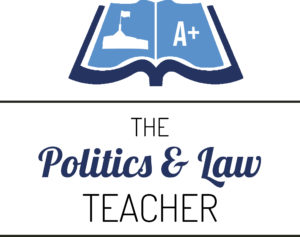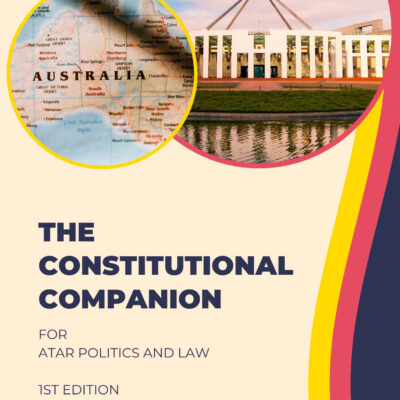This blog post supports Infographic 3/21, published in July 2021.
Syllabus:
- Accountability of the Executive – Auditor -General, Senate Estimates, Individual Ministerial Responsibility
- Roles and powers of the Opposition
- Roles and powers of the Parliament
Cross-references:
- PAL News Update V3N1 Jan/Feb 2020 – Minister Brigette McKenzie held accountable.
Senator Bridget McKenzie was the Minister for Sports until her resignation in February 2020.
During the period leading up to the 2019 general election, Minister McKenzie used ministerial discretion to make grants to sports clubs. Minister made the grants from funds allocated to the Community Sport Infrastructure Grant (CSIP) program.
The Australian Sports Commission Act 1985 established Sport Australia as the independent agency responsible for recommending grants under the CSIP. The Act and Sport Australia have rules governing the proper process for applying for and making grants to build community sport infrastructure such as change rooms, swimming pools and the like. The process involves sports clubs making applications to Sport Australia. Sport Australia assesses applications using criteria designed to increase the participation of community members in sport.
The Auditor-General’s office carried out an audit of the CSIP program and found that funding decisions were “not informed by an appropriate assessment process and sound advice”. It also raised concerns about the legality of the Minister’s decisions overriding Sport Australia recommendations.
Constitutional law expert Anne Twomey raised legal questions. She argued that Williams v Commonwealth [2014] made executive grants unconstitutional if Parliament has the power to authorise the payments. Parliament authorised had Sport Australia to make the grants via the Australian Sports Commission Act 1985. However, the way the CSIG program was designed gave the Minister discretion to make grants and, therefore, the program may be unconstitutional. Anne Twomey also argued that ministerial discretion only applies to ministers directing government departments, not ‘corporate entities’ like Sport Australia.
Minister McKenzie defended her right to use ministerial discretion to make CSIP funding decisions, even if they conflicted with Sport Australia’s recommendations. She claimed her decisions resulted in more balanced and evenly distributed CSIP grants.
The Minister made a disproportionately large number of grants to clubs located in marginal electorates the Coalition government needed to win in order to retain office in the 2019 election. As a result, Senator McKenzie was accused of pork-barrelling, which refers to governments misusing taxpayers’ money for political advantage instead of the public good. Pork-barrelling is spending in marginal electorates in the hope of winning them. Pork-barrelling is a form of political corruption – described by Keane (2020) as “soft corruption”.
Journalist Andrew Probyn discovered that the Sports Minister’s office produced a colour-coded spreadsheet detailing marginal seats targeted for grants. This discovery triggered a further investigation by the Senate. As a result, the Select Committee on Administration of Sports Grants was established to investigate. A Senate Estimates Committee later investigated who altered a final authority to make grants payments after the Minister signed it days before Parliament was dissolved for the election. Furthermore, an email trail of 136 messages between the office of the Sports Minister and the Prime Minister’s Office was used by Labor Senator Penny Wong to allege Scott Morrison was “up to his neck” in the scandal.
Opposition Leader Anthony Albanese said the Minister’s decisions “fail every test”, and she must be sacked or resign under the convention of individual ministerial responsibility. Senator McKenzie defended her decisions, saying, “no project that received funding was not eligible to receive it” and “no rules were broken in this program”.
All the while, the Prime Minister and Cabinet stood by Bridget McKenzie. However, the Auditor-General revealed that Senator McKenzie had granted $36,000 to a shooting club of which she was a member. This revelation led the Prime Minister to refer the matter to the head of the Department of Prime Minister and Cabinet, Phil Gaetjens. Mr Gaetjens was tasked with conducting an inquiry into this particular revelation. Notably, he was not asked to look into the broader pork-barrelling allegations or the legality of the Minister’s decisions.
By restricting the scope of the government inquiry, Mr Morrison protected the government and the Minister from the more serious allegations. The parliamentary inquiries conducted by the Senate committees were more effective from an accountability perspective, as was the independent audit carried out by the Auditor-General.
The Gaetjens’ Inquiry found that Minister McKenzie had breached the ministerial code of conduct through the shooting club grant. She resigned as a consequence. Her resignation significantly reduced the political pressure the Opposition was able to bring to bear on the government.
The sports rorts affair illustrates the effectiveness of the Auditor-General and Senate committees, including Estimates committees, in holding the executive accountable. Further, the affair illustrates the roles of the Opposition and Parliament in holding the government responsible. In practice, the Parliament could not dismiss the Minister despite evidence of pork-barrelling and potentially illegal decisions made by the Minister. Instead, it was left to the government itself to hold the Minister to account and, in the process, protect itself from more serious allegations of political corruption. The Westminster convention of individual ministerial responsibility did not operate as theory suggests; however, it did provide the expectations of ministerial conduct that, together with the ministerial code of conduct (originating from the Howard era), resulted in the Minister’s resignation.
A similar issue has been exposed by the Auditor-General with respect to car park construction funding from the Urban Infrastructure Fund. Funding decisions were made by the minister and car parks were constructed next to train stations in marginal electorates. The Opposition labelled it the “pork-’n-ride” scheme. The matter is still under investigation. The Opposition has accused the government of setting up 22 ‘discretionary funds’ similar to the CSIP and the Urban Infrastructure Fund. It fears these funds will be used to pay for spending in marginal electorates before the next election. Mr Albanese committed the Labor Opposition – as the alternative government – to introducing legislation to “force ministers who approve grants rejected by their departments, or award grants in their own electorates, to report the decision to the Finance Minister within 30 days”. The Finance Minister would then have to table the report in Parliament within five days. The Opposition Leader claimed the rules would expose ministerial misuse of funds and discourage pork-barrelling.



All comments are moderated before publication.